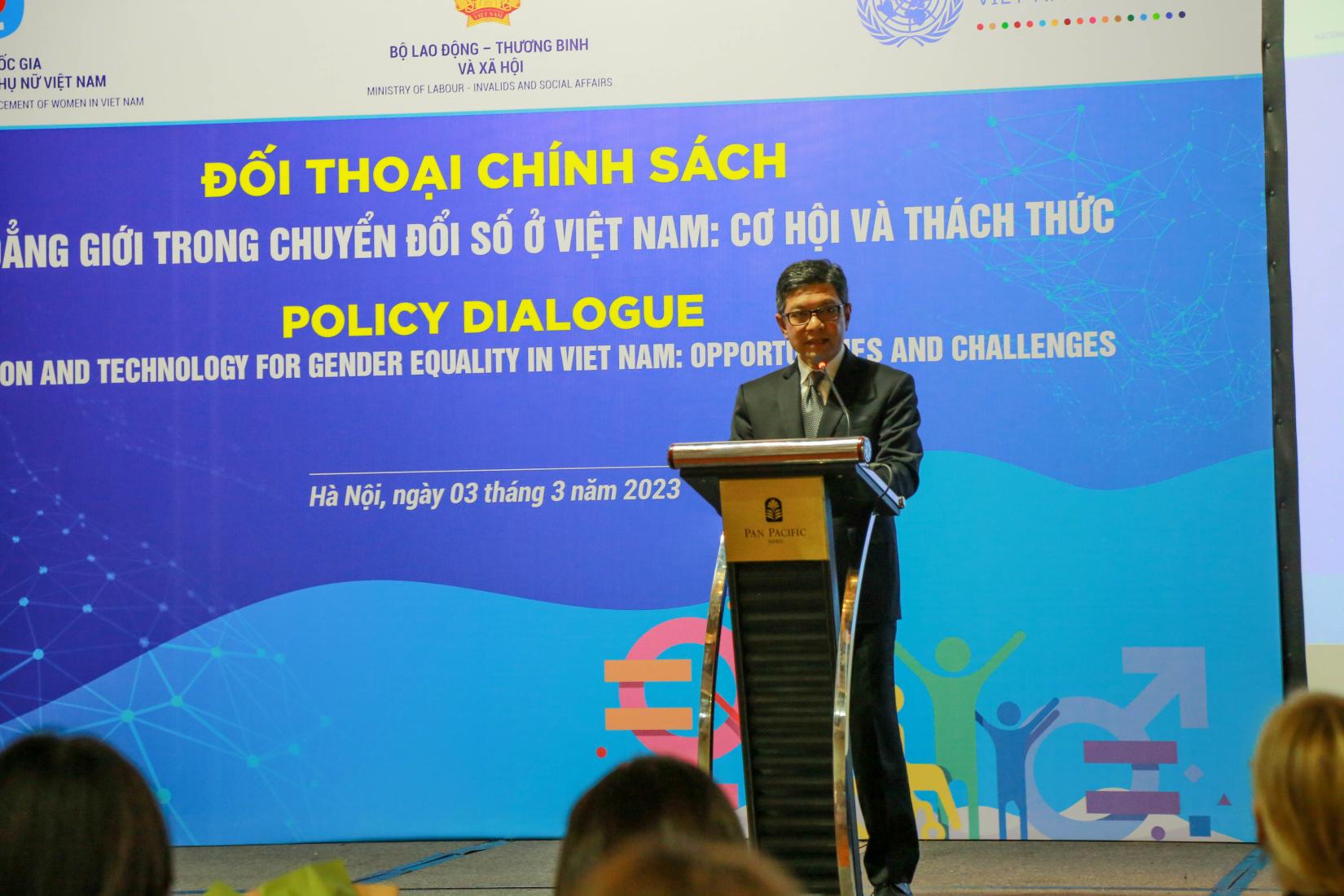Ambassador of Indonesia to Viet Nam | Policy Dialogue: “Gender equality in digital transformation in Viet Nam: Opportunities and challenges”
Speech by H.E. Mr. Denny Abdi, Ambassador of Indonesia to Viet Nam

H.E. Madame Nguyen Thi Ha, Vice Minister for Labor, Invalids and Social Affairs, Viet Nam
H.E. Mr. Trieu Van Cuong, Vice Minister of Home Affairs, Viet Nam
Ms. Pauline Tamesis, UN Resident Coordinator, Viet Nam,
Ms. Elisa Fernandez, Country Representative, UN Women Viet Nam,
Excellencies, Ambassadors and distinguished participants.
A very good morning to all of you,
Allow me to take this opportunity to share Indonesian experience on this matter.
Indonesia is currently enjoying a demographic bonus. With a population of almost 280 million people, roughly 70% of which or around 198 million people are in the productive age. This is an important asset for our economy.
One sector in particular, absorbs 97% of that workforce and contributes more than 60% of Indonesia’s GDP. That sector is micro, small, and medium enterprises (MSMEs). Currently, Indonesia has 65.4 million MSMEs and the majority of it (64.5%) is owned and managed by women.
During the height of COVID-19 pandemic, the MSMEs were among the hardest hit, and so were the women. Women who largely depend on family income experienced extra pressures, not just from the reduced income, but also from the traditional burden sharing in the household.
While most of the family members were working or studying from home, women-especially working mothers-were still expected to take up much of the unpaid, domestic works.
Nevertheless, the pandemic also brought in new opportunities as consumer spending shifted from offline to online platforms. Data from the Indonesian Central Bank (2020) showed that
e-commerce sales increased by 18%.
Among new MSMEs, women-owned MSMEs benefited 8-10% more than men-owned from using digital platform. e-commerce provides alternative way for women to stay creative, productive, and empowered, especially for stay-at-home mothers and women workers in informal sector.
Recognizing this potential and the role of women in the economy, the Indonesian government is committed to promote the empowerment of women through policies which consider the
gender perspective.
Women are encouraged to become entrepreneurs with the support of innovation and technological development to achieve gender equality. Technological innovation makes it easier for women to start and grow businesses by providing access to funding, marketing tools and other resources, such as accounting and warehousing apps.
Concrete examples of these policies include:
- USD 17.8 billion in small enterprise credit for 2.4 million women entrepreneurs.
- USD 1.1 billion for micro enterprise assistance program with women makes up 63.5% of its beneficiaries.
- Facilitation MSMEs entry into digital ecosystem to expand access in marketing, increasing effectiveness and efficiency in business process, increasing purchasing transaction, and improving competitiveness of MSMEs.
→ Government targets for MSMEs participation in digital marketplace:
- 17.5 million MSMEs during COVID-19 pandemic
- Target > 24 million MSMEs by 2023
- Target > 30 million MSMEs by 2024
- Entrepreneurship training with gender perspective for vulnerable women.
- Women and children-friendly villages, from district to provincial levels.
- Promoting financial inclusion and literacy.
Digital banking and payment system help women for greater access and manage their finances, especially where traditional banking services are limited or inaccessible.
While digital literacy is continuing to improve, Indonesian MSMEs still faces challenges to enhance its competitiveness, to graduate into the next level.
Data from IMD World Competitiveness Online ranks Indonesia in 51st position out of 63 countries surveyed in 2022. Although it is still quite far away from the top, Indonesia has managed to increase its position relatively steady from the 62nd spot in 2018, even during the pandemic.
This proves that Indonesia has the capability and resilience to continue moving forward.
Going forward and to strengthen implementation of Goal 5 of the SDGs, Indonesia will put special emphasis on how to set development strategies to target vulnerabilities in the postpandemic era.
To encourage effective implementation of regulations that create competitiveness.
To encourage the financial sector to play a more active role in credit growth.
To strengthen health and education sectors as future sources of competitiveness.
All the while, maintaining gender perspective in national development policies.
These sentiments, we gladly noted, also reflected in the policy recommendations for Viet Nam.
Our fellow ASEAN member has demographic characteristics that are similar to Indonesia, so we may anticipate similar challenges and opportunities in the future. Certainly we need more women entrepreneurs to maintain ASEAN as the epicentrum of growth, in line with the theme of ASEAN under Indonesia’s chairmanship this year,
We appreciate the opportunity to be a part of this timely dialogue.
Thank you.

















